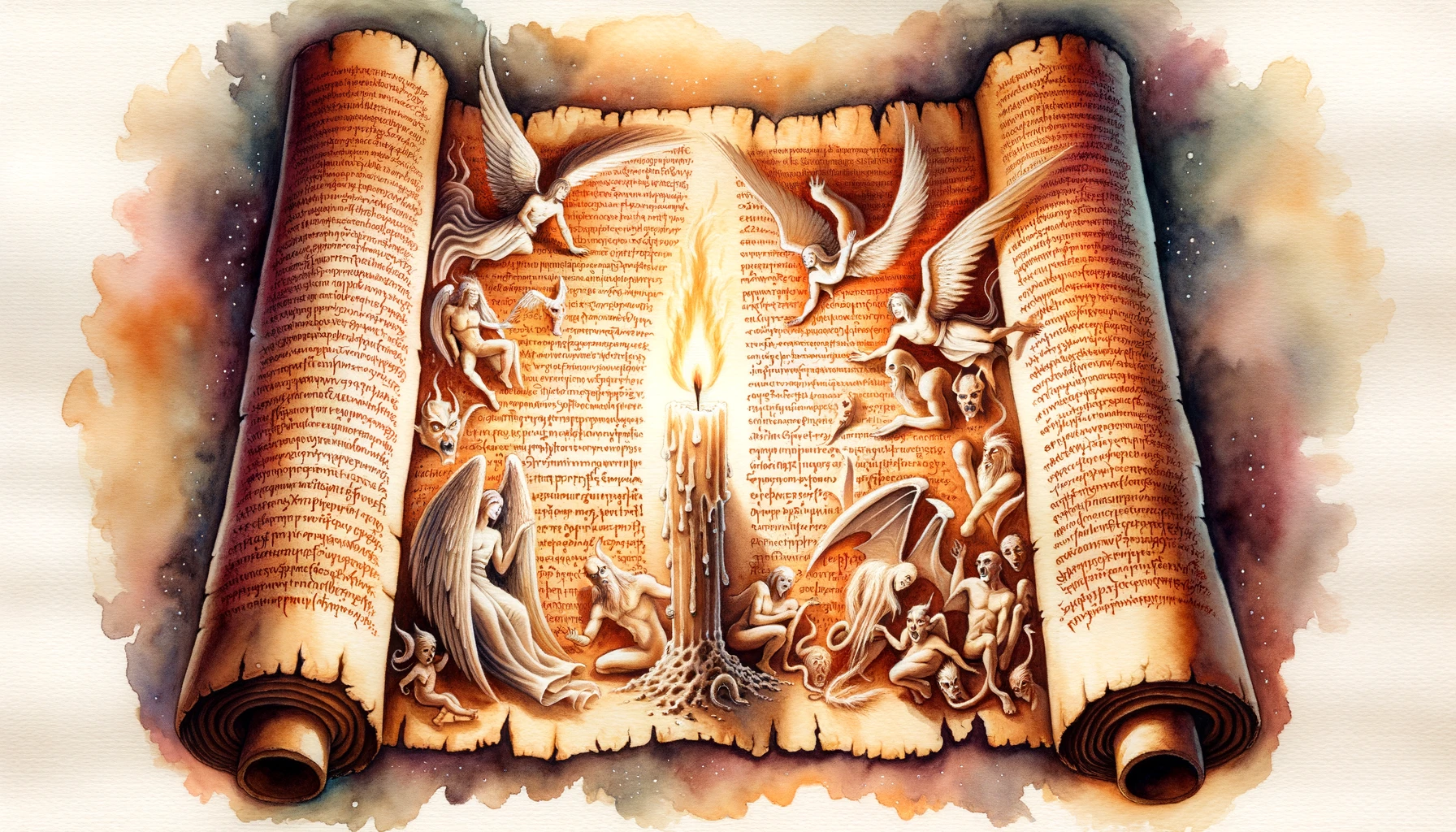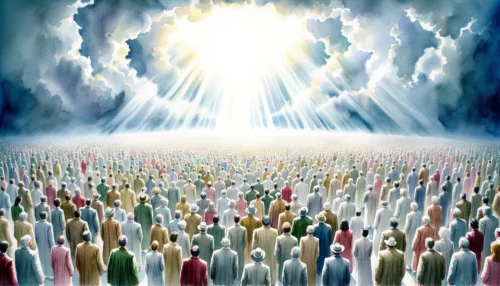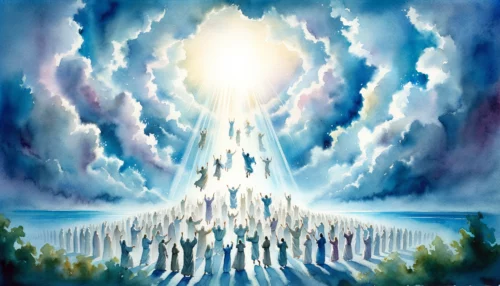In our quest for spiritual understanding, we turn to the Bible, the cornerstone of our faith, to learn about the nature, activity, and influence of demons. The Bible paints a sobering picture of these spiritual beings, emphasizing the spiritual warfare that exists, but also reminding us of the power and authority that God has over them. This article will provide an in-depth examination of what the Bible says about demons, aiming to dispel myths, address concerns, and clarify the Christian perspective on this issue.
The Origin and Nature of Demons
To comprehend the biblical perspective on demons, we need to begin at the origin. The Bible indicates that demons are fallen angels who joined Lucifer, now known as Satan, in his rebellion against God. This event occurred before the creation of humanity and is believed to have led to the fall of a significant number of angels from heaven (Revelation 12:3-9).
These fallen angels, or demons as they are commonly referred to, are spiritual beings. They are not omnipresent, omnipotent, or omniscient as God is. However, they possess a certain degree of power and knowledge beyond human capabilities due to their angelic origins. Unlike God, they are not creators, and their power is limited and subordinate to God’s sovereignty (Job 1:6-12).
According to the Bible, demons are deceptive and malevolent beings. They operate under the authority of Satan, the chief of the fallen angels, and work to carry out his evil plans. Their activities are always aimed at causing destruction, promoting lies, and leading people away from God. Their ultimate goal is to oppose God’s will and hinder His plans (John 8:44).
It’s important to note that demons are not to be equated with Satan in terms of authority or power. Satan is portrayed as the ruler or the prince of demons, and while they work under his influence, he is considered to be the most powerful among them (Matthew 12:24).
The Bible’s depiction of demons paints a clear picture of their nature. These are beings that once basked in the glory of God’s presence but chose to rebel and were cast out. They exist in the spiritual realm and interact with the physical world, often in ways that foster negativity, deception, and harm. However, their power and influence are not unchecked. They operate under limitations set by God and are ultimately subject to His authority.
Understanding the origin and nature of demons according to the Bible can help us recognize their limitations and the purpose of their existence. It reminds us of the reality of spiritual warfare, but also reassures us of God’s ultimate authority over all things, including these rebellious spirits. They may be a part of our spiritual landscape, but they do not have the final say in our lives or in the ultimate unfolding of God’s plan.
Demonic Activity as Described in the Bible
The Bible provides us with numerous examples of demonic activity, shedding light on the nature and intentions of these spiritual beings. Most commonly, demons are seen attempting to influence humans towards evil, spreading lies, and sowing discord.
A prominent example of demonic influence is found in the Gospels where demons are shown causing physical and mental afflictions. These include incidents of demon possession where individuals exhibit strange behavior, superhuman strength, or illnesses that couldn’t be explained by natural causes (Mark 5:1-20). In these cases, the afflicted individuals are freed when the demons are expelled by Jesus, demonstrating His power over these spiritual entities.
Demons are also seen in the Bible trying to mislead people and lead them away from God. They do this by spreading false teachings, promoting idolatry, and encouraging sinful behavior. For instance, in the New Testament, we see warnings against doctrines promoted by deceitful spirits and teachings of demons (1 Timothy 4:1).
Throughout the Bible, demons are seen opposing God’s work and attempting to obstruct His plans. This is evident when Jesus was tempted by Satan in the wilderness (Matthew 4:1-11). While this incident specifically involves Satan, it provides insight into the broader demonic strategy of attempting to derail God’s plans through temptation and deceit.
As with all elements of creation, demons are under God’s authority. Despite their attempts to influence the world towards evil, their actions are limited by God’s power and sovereignty. Jesus demonstrated His authority over demons numerous times in the New Testament, casting them out and freeing individuals from their influence.
By examining demonic activity as described in the Bible, we gain a clearer understanding of the strategies and tactics employed by these entities. They seek to lead individuals away from God through deception, temptation, and affliction. However, the Bible consistently reminds us of God’s authority over these spiritual beings and their ultimate defeat. This knowledge serves as a source of hope and reassurance in the face of spiritual warfare, reminding us that God’s power far surpasses that of the demonic realm.
The Power and Authority over Demons: A Biblical Perspective
The Bible is clear on the fact that God has ultimate authority over demons. This authority is absolute, extending over every aspect of the universe, including the spiritual realm. Despite the disruptive activities of demons, they are always under God’s sovereign control and can do nothing outside of His allowance (Job 1:6-12).
The New Testament, in particular, underscores this divine authority over demonic forces through the ministry of Jesus Christ. Throughout His earthly ministry, Jesus demonstrated His power over demons by casting them out of people who were possessed or oppressed by them (Mark 1:34). These acts of deliverance were clear affirmations of His divine authority and an integral part of His mission to destroy the works of the devil (1 John 3:8).
Jesus granted this authority to His disciples. In the Gospels, we find accounts of Jesus sending out His disciples with the power and authority to cast out demons (Luke 9:1). This was not just a testament to the power of Jesus, but also a clear indication of the believer’s position in Christ. As followers of Christ, believers are given the authority to resist demonic influences (James 4:7). This authority doesn’t come from the believer’s own power, but from Christ. It’s not a matter of personal ability or spiritual prowess. Rather, it’s an extension of Christ’s victory over sin and death, and His triumph over demonic powers (Colossians 2:15).
The Bible assures us of the final defeat of Satan and his demons. The book of Revelation speaks of a time when Satan, the leader of the demonic forces, will be thrown into the lake of fire, marking the end of his influence (Revelation 20:10).
When we consider what the Bible says about the power and authority over demons, we see a consistent message of hope and victory. God’s authority over demons is absolute and He has extended a measure of this authority to those who believe in His Son, Jesus Christ. Despite the reality of spiritual warfare, we can stand firm in the knowledge that we are on the winning side. The struggles may be real, but so is God’s power and authority over all things, including demons. In the face of such divine power, the efforts of the demonic realm pale in comparison.
Finding Hope in the Battle
Throughout our examination of the Bible’s teachings on demons, we have discovered a consistent message of God’s ultimate authority and power. Although these spiritual beings operate in ways that seek to oppose God and influence humanity towards evil, they are ultimately subject to God’s control.
To further reflect on this topic, consider the following questions:
- How does knowing that God has authority over demons impact your personal faith journey?
- In what ways can you rely on God’s power to resist temptation and demonic influences in your life?
- How might a deeper understanding of spiritual warfare help you better support and encourage fellow believers?
Let us find hope and assurance in the knowledge that our God is greater than any power of darkness, and that, through faith in Jesus Christ, we share in His victory over sin, death, and the forces of evil. Stand firm in this truth, and remember that nothing in the spiritual realm can separate us from the love and protection of our Almighty God.














